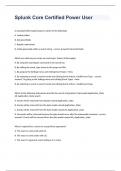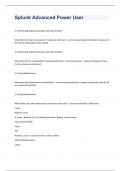Splunk power user exam - Study guides, Class notes & Summaries
Looking for the best study guides, study notes and summaries about Splunk power user exam? On this page you'll find 125 study documents about Splunk power user exam.
Page 3 out of 125 results
Sort by
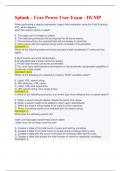
-
Splunk - Core Power User Exam - DUMP| 2024 Q&A
- Exam (elaborations) • 15 pages • 2024
-
- $17.99
- + learn more
Splunk - Core Power User Exam - DUMP When performing a regular expression (regex) field extraction using the Field Extractor (FX), what happens when the require option is used? A. The regex can no longer be edited. B. The field being extracted will be required for all future events. C. The events without the required field will not display in searches. D. Only events with the required string will be included in the extraction. Which of the following statements describe data model accel...
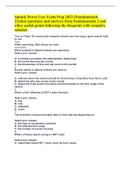
-
Splunk Power User Exam Prep 2023 (Fundamentals 2);Quiz questions and answers from Fundamentals 2 and other useful points following the blueprint with complete solution
- Exam (elaborations) • 13 pages • 2023
-
Available in package deal
-
- $11.49
- + learn more
Splunk Power User Exam Prep 2023 (Fundamentals 2);Quiz questions and answers from Fundamentals 2 and other useful points following the blueprint with complete solution True or False: The search job inspector shows you how long a given search took to run. True When searching, field values are case: Insensitive Warm buckets in Splunk indexes are named by: Select your answer. A: a naming convention the administrator determines B: the server that sent the events C: the timestamps of fir...
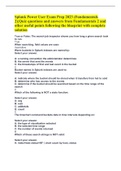
-
Splunk Power User Exam Prep 2023 (Fundamentals 2);Quiz questions and answers from Fundamentals 2 and other useful points following the blueprint with complete solution
- Exam (elaborations) • 13 pages • 2023
-
Available in package deal
-
- $11.49
- + learn more
Splunk Power User Exam Prep 2023 (Fundamentals 2);Quiz questions and answers from Fundamentals 2 and other useful points following the blueprint with complete solution True or False: The search job inspector shows you how long a given search took to run. True When searching, field values are case: Insensitive Warm buckets in Splunk indexes are named by: Select your answer. A: a naming convention the administrator determines B: the server that sent the events C: the timestamps of fir...
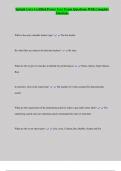
-
Splunk Core Certified Power User Exam Questions With Complete Solutions
- Exam (elaborations) • 26 pages • 2024
- Available in package deal
-
- $18.99
- + learn more
Splunk Core Certified Power User Exam Questions With Complete Solutions What is the only writeable bucket type? The hot bucket By what filter are indexes divided into buckets? By time What are the 4 types of searches in Splunk (by performance) Dense, Sparse, Super Sparse, Rare In searches, what is the scanCount? The number of events scanned for that particular search
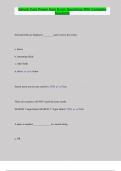
-
Splunk Core Power User Exam Questions With Complete Solutions
- Exam (elaborations) • 33 pages • 2024
- Available in package deal
-
- $21.99
- + learn more
Splunk Core Power User Exam Questions With Complete Solutions Selected fields are displayed ________ each event in the results. a. below b. interesting fields c. other fields d. above a. below Search terms are not case sensitive. (T/F) True These two searches will NOT return the same results. SEARCH 1:login failure SEARCH 2: "login failure" (T/F) True
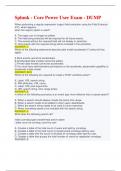
-
Splunk - Core Power User Exam - DUMP | 2024 questions & answers
- Exam (elaborations) • 15 pages • 2024
-
- $17.99
- + learn more
Splunk - Core Power User Exam - DUMP When performing a regular expression (regex) field extraction using the Field Extractor (FX), what happens when the require option is used? A. The regex can no longer be edited. B. The field being extracted will be required for all future events. C. The events without the required field will not display in searches. D. Only events with the required string will be included in the extraction. Which of the following statements describe data model accel...
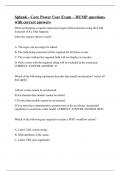
-
Splunk - Core Power User Exam – DUMP questions with correct answers
- Exam (elaborations) • 27 pages • 2024
- Available in package deal
-
- $15.49
- + learn more
When performing a regular expression (regex) field extraction using the Field Extractor (FX), what happens when the require option is used? A. The regex can no longer be edited. B. The field being extracted will be required for all future events. C. The events without the required field will not display in searches. D. Only events with the required string will be included in the extraction. CORRECT ANSWER ANSWER: D Which of the following statements describe data model acceleration? (se...
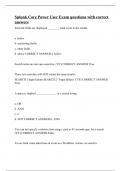
-
Splunk Core Power User Exam questions with correct answers
- Exam (elaborations) • 22 pages • 2024
- Available in package deal
-
- $12.99
- + learn more
Selected fields are displayed ________ each event in the results. a. below b. interesting fields c. other fields d. above CORRECT ANSWER a. below Search terms are not case sensitive. (T/F) CORRECT ANSWER True These two searches will NOT return the same results. SEARCH 1:login failure SEARCH 2: "login failure" (T/F) CORRECT ANSWER True A space is implied ______________ in a search string. a. OR b. AND c. () d. NOT CORRECT ANSWER b. AND You can not specify a relative ti...
Splunk Core Certified Power User exam 2023 with 100% correct answers
Splunk Advanced Power User exam 2023 with 100% correct answers

$6.50 for your textbook summary multiplied by 100 fellow students... Do the math: that's a lot of money! Don't be a thief of your own wallet and start uploading yours now. Discover all about earning on Stuvia



